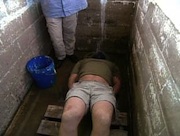
Confirmation that the British Army tortured prisoners in Ireland during interrogations in the 1970s is emerging after one of the victims launched an appeal against his conflict-related conviction.
Liam Holden was sentenced to hang after being convicted in 1973 of the murder of a soldier, largely on the basis of an unsigned confession. His death sentence was commuted to life imprisonment and he spent 17 years behind bars.
The jury did not believe Holden’s insistence that he made the confession only because he had been held down by members of the Parachute Regiment, whom he says placed a towel over his face before pouring water from a bucket over his nose and mouth. The torture technique, known as ‘waterboarding’, is akin to drowning.
But now the Criminal Cases Review Commission (CCRC) has referred Holden’s case to the court of appeal in Belfast after unearthing new evidence, and because of doubts about “the admissibility and reliability” of his confession.
The commission says it believes “there is a real possibility” his conviction will be quashed. After a preliminary hearing last month, Holden’s appeal was adjourned.
Lawyers who have taken up his case have identified a second man who gave a similar account of being waterboarded after being arrested by the RUC. In a statement to a doctor in April 1978, this man said the RUC had put a towel over his face and poured water over his nose and mouth, and that “this was frightening and was repeated on a number of occasions”. He was eventually released without charge. The CCRC also has a statement taken from a third man who says he was waterboarded by the British army in the early 70s.
All of the allegations come from a period after March 1972, when the then British prime minister, Ted Heath, claimed to have banned notorious torture methods which were later condemned by the European court of human rights as being inhuman and degrading.
Holden, a Roman Catholic, was 19 and a chef when he was seized during a raid by soldiers of the Parachute Regiment on his parents’ home in the Ballymurphy area of west Belfast in October 1972.
He said that after being arrested in his bed the soldiers had taken him to their base on Black Mountain, west of Belfast, where he was beaten, burned with a cigarette lighter, hooded and threatened with execution.
Holden also gave a detailed account of being waterboarded, although he did not use that term. In a court report published the following day, it was reported that the defendant told the jury that he had been pushed into a cubicle where he was held down by six men, that a towel was placed over his head, and that water was then poured slowly over his face from a bucket. “It nearly put me unconscious,” Holden was quoted as saying. “It nearly drowned me and stopped me from breathing. This went on for a minute.” A short while later he was subjected to the same treatment again, he said.
A sergeant from the Parachute Regiment and a British army captain told the court that Holden had confessed to the shooting during an “interview”. The unnamed sergeant said Holden had wanted to confess to the murder because “he wanted to get it off his chest”, while the officer said the teenager had told him that he had left the IRA a short while later because he felt such remorse.
The jury took less than 75 minutes to convict Holden of capital murder, and the judge, Sir Robert Lowry, told him: “The sentence of the court is that you will suffer death in the manner authorised by law.” The then British secretary, William Whitelaw, commuted the sentence the following month, and the death penalty was abolished in the Six Counties shortly afterwards. Holden did not appeal, however, with relatives saying at the time that he believed his trial had been “rigged” and a “farce”.
He was eventually released from prison in 1989.
Holden’s solicitor, Patricia Coyle, said: “At trial Mr Holden gave compelling evidence that the alleged confession was obtained by the army using water torture. He spent 17 years in jail. He is looking forward to the court hearing his appeal.”
The new evidence that the CCRC has submitted to the court of appeal is being kept secret. The CCRC is unwilling to discuss this material, other than to say that it has not yet been disclosed at the request of the public body from which it was obtained. Holden’s lawyers are now asking for it to be disclosed.
Seven months before Holden was detained by British soldiers, the Heath government had publicly repudiated and banned five “interrogation techniques”. RUC officers had learned the techniques - hooding, sleep deprivation, starvation and the use of stress positions and noise - from British military intelligence officers, but Heath assured the Commons that they “will not be used in future as an aid to interrogation”.
Waterboarding was used on republican prisoners as a form of punishment, as well as a means of extracting confessions. The British army also experimented with other methods of torture, including electric shocks, and the use of drugs.
In recent years, British military officers have admitted the use of waterboarding as early as the late sixties.
![[Irish Republican News]](https://republican-news.org/graphics/title_gifs/rn.gif)
![[Irish Republican News]](https://republican-news.org/graphics/title_gifs/harp.gif)

